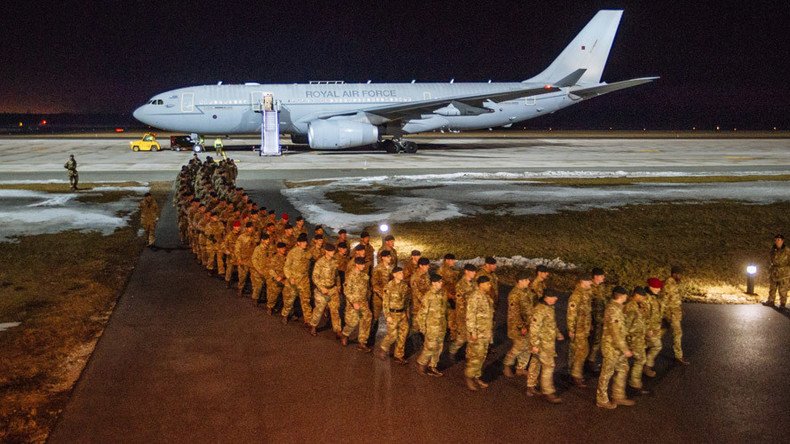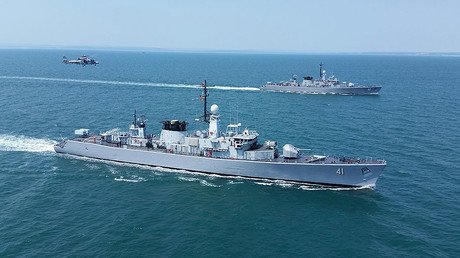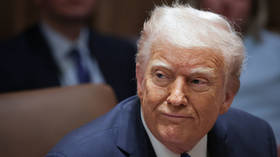UK troops deployed in Estonia to ‘defend NATO’ from Russia (VIDEO)

The first batch of British soldiers has arrived in Estonia to serve as part of the NATO's Enhanced Forward Presence on the borders of Russia and part of “wider efforts to defend the alliance” from the perceived threat from Moscow.
Some 130 soldiers from 5 Rifles RAF Brize Norton in Oxfordshire landed at the Amari airbase near Tallinn on Friday night where they were welcomed by the UK's Ambassador Bubbear Theresa and the 1st Infantry Brigade commander of Estonian forces Colonel Veiko-Vello Palm.
They will now link-up with some 80 British servicemen who were sent in advance to prepare the facilities for the arrival of the soldiers.
In the coming weeks, additional British troops will be dispatched. A French contingent is also due, accompanied by tanks, reconnaissance drones and infantry fighting vehicles to form a 1,200-strong detachment.
The NATO battle group in Estonia will be stationed at Tapa. The UK will contribute the bulk of multinational force in Estonia, sending in a total of 800 soldiers. France will post 300 soldiers to Estonia — to be replaced by the Danes in 2018. All troops will act in conjunction with Estonia's 1st Infantry Brigade.
The #eFP battlegroup started arriving to #Estonia as 130 #UK troops landed at Ämari AB. #NATO#StrongerTogetherpic.twitter.com/Ve9szm9m2p
— Eesti Kaitsevägi/EDF (@Kaitsevagi) March 17, 2017
NATO's forces in Estonia are just one of four multinational battalion-size battle groups which the alliance started positioning earlier this year in Latvia, Lithuania, and Poland on a rotational basis. The “defensive” measures were agreed during the NATO-Warsaw summit in July.
These units — led by the United Kingdom, Canada, Germany, and the United States, along with their military hardware — are NATO’s biggest deployment of troops along Russian borders since the end of the Cold War. The battalions are set to become fully operational by June.
The deployment is designed to counter an “increasingly assertive Russia,” UK’s Defence Secretary, Sir Michael Fallon said on the troops' departure.
“NATO is stepping up its commitment to collective defense,” Fallon said, according to Sky news. “British troops will play a leading role in Estonia and support our US allies in Poland, as part of wider efforts to defend NATO.”
Besides stretching its reach into Eastern Europe, NATO is also beefing up its presence in the Black Sea region — on land, at sea, and in the air with several countries already contributing their forces and expertise.
“We agreed on two additional maritime measures: an increased NATO naval presence in the Black Sea for enhanced training, exercises and situational awareness, and a maritime coordination function for our Standing Naval Forces when operating with other allied forces in the Black Sea region,” NATO Secretary-General Jens Stoltenberg announced last month.
Just Friday, four NATO warships sailed into the Port of Odessa, according to the Ukrainian Navy. Despite not being a member of NATO, Ukraine will host the ships right on Russia's doorstep until April 20.
'#NATO keeps trying to draw Russia into confrontation' - Putin https://t.co/ntw5mzTCZApic.twitter.com/lVSJF7iyMJ
— RT (@RT_com) 16 February 2017
Moscow has over the years, repeatedly warned against the threat of NATO's eastward expansion. Apart from NATO's enhanced Forward Presence and the Black Sea buildup, Russia has also been vocal about last year's launch of a new ground-based missile defense system in Romania known as Aegis Ashore. Another part of the system, which will see a missile launch platform in Poland, is expected to be operational by 2018.
Putin: Russia to oppose any attempts to break strategic balance, incl NATO missile system https://t.co/DKgTJzUX2apic.twitter.com/0LhrytHGuP
— RT (@RT_com) 18 November 2016
In latest remarks, Russian President Vladimir Putin accused NATO in February of posing a threat to global security by trying to provoke a conflict with Moscow through its “newly-declared official mission to deter Russia.”














